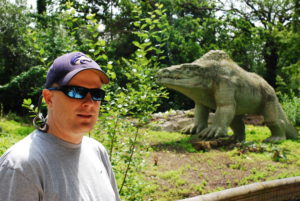
Position: Associate Professor
Field: 19th Century, Science/Medicine
Region: Europe & Russia, United States
Office: 350B Old Horticulture
Email: bellonr@msu.edu
Phone: (517) 884-4964
Richard Bellon is a historian of nineteenth-century science which means that, for much of the last several years, he has devoted much of his time to men with muttonchops who obsessed over the sex lives of plants.
His 2011 essay, “Inspiration in the Harness of Daily Labor: Darwin, Botany and the Triumph of Evolution, 1859-1868,” won the 2013 Derek Price/Rob Webster Prize from the History of Science Society.
His 2014 book A Sincere and Teachable Heart: Self-Denying Virtue in British Intellectual Life, 1736-1859 moves beyond the history of Victorian science to argue that respectability and authority in eighteenth- and nineteenth-century Britain were not grounded foremost in ideas or specialist skills but in the self-denying virtues of patience and humility.
He teaches in both History and the Lyman Briggs College. His classes cover a wide range of topics, including: freshmen introductions to the history, philosophy and sociology of science; history seminars on Victorian Britain; graduate courses on the history of biology; surveys of the history of molecular biology and biotechnology; and seminars on contemporary science policy. He also directs a study-abroad program to London dedicated to the history of Victorian science with his biologist colleague, Jim Smith; it is scheduled to run next in the summer of 2019.
Outside of his academic pursuits, he knows the meaning of “long-suffering” and has a thing for ’70s music.
Publications:
Books:
A Sincere and Teachable Heart: Self-Denying Virtue in British Intellectual Life, 1736-1859. Brill: 2014.
Research articles:
“There is Grandeur in This View of Newton: Charles Darwin, Isaac Newton and Victorian Conceptions of Scientific Virtue.” Endeavour 38 (2014): 222-34.
“Bringing Relationships Alive through Interdisciplinary Discourse (BRAID)” (co-authors Doug Luckie and Ryan Sweeder). International Journal of Pedagogy and Curriculum 19 (2013): 133-44.
“Darwin’s Evolutionary Botany.” In The Cambridge Encyclopedia of Darwin and Evolutionary Thought, edited by Michael Ruse, pp. 131-8. Cambridge: University of Cambridge Press, 2013.
“The Moral Dignity of Inductive Method and the Reconciliation of Science and Faith in Adam Sedgwick’s Discourse.” Science & Education 21 (2012): 937-58.
“The ‘BRAID’: Experiments in Stitching Together Disciplines at a Big Ten University” (co-authors Doug Luckie and Ryan Sweeder). Journal of STEM Education 13 (2012): 6-14.
“Inspiration in the Harness of Daily Labor: Darwin, Botany and the Triumph of Evolution, 1859-1868.” Isis 102 (2011): 392-420.
“Charles Darwin Solves the ‘Riddle of the Flower’; or, Why Don’t Historians of Biology Know about the Birds and Bees?” History of Science 47 (2009): 373-406.
“Science at the Crystal Focus of the World.” In Science in the Marketplace, edited by Bernard Lightman and Aileen Fyfe, pp. 301-35. Chicago: University of Chicago Press, 2007.
“Joseph Hooker Takes a ‘Fixed Post’: Transmutation and the ‘Present Unsatisfactory State of Systematic Botany,’ 1844-60.” Journal of the History of Biology, 39 (2006): 1-39.
“A Question of Merit: John Hutton Balfour, Joseph Hooker and the ‘Concussion’ over the Edinburgh Chair of Botany.” Studies in History and Philosophy of Biological and Biomedical Sciences, 36 (2005): 25-54.
“The Great Question in Agitation: George Bentham and the Origin of Species.” Archives of Natural History, 30 (2003): 282-97.
“Joseph Hooker’s Ideal for a Professional Man of Science.” Journal of the History of Biology, 34 (2001): 51-82.